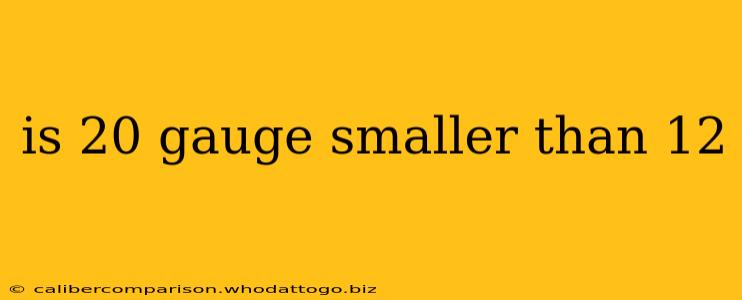The simple answer is yes, 20 gauge is smaller than 12 gauge. But understanding why this is true, and what the implications are for shooters, requires a deeper dive into the fascinating world of shotgun gauges.
What Does "Gauge" Mean in Shotguns?
Unlike rifles and handguns that use caliber measurements (e.g., .22, .308, 9mm), shotguns use a system called "gauge" to specify the bore diameter. The gauge number indicates how many lead balls of that bore diameter are required to weigh one pound. Therefore, a lower gauge number means a larger bore diameter.
This means a 12-gauge shotgun has a larger barrel diameter than a 20-gauge shotgun. Since it takes fewer lead balls to equal one pound for a larger diameter, the gauge number is lower. Conversely, a smaller barrel diameter requires more lead balls, resulting in a higher gauge number.
Comparing 12 Gauge and 20 Gauge Shotguns
Here's a breakdown of the key differences between 12 gauge and 20 gauge shotguns:
Barrel Diameter & Shell Size:
- 12 Gauge: Larger barrel diameter, meaning larger shells with more shot or a heavier slug.
- 20 Gauge: Smaller barrel diameter, resulting in smaller shells with less shot or a lighter slug.
Recoil:
- 12 Gauge: Generally produces more recoil due to the larger shell and greater payload. This can be more challenging for new or smaller shooters.
- 20 Gauge: Offers less recoil, making it more comfortable to shoot, especially for extended periods.
Shot Capacity & Pattern:
- 12 Gauge: Typically holds more shot per shell, leading to potentially denser shot patterns at longer ranges.
- 20 Gauge: Although holding less shot, the smaller bore can result in tighter patterns at closer ranges, making it effective for hunting smaller game.
Applications:
- 12 Gauge: A versatile gauge used for hunting a wide variety of game, including waterfowl, upland birds, deer (using slugs), and even home defense. Its power and availability make it a popular choice.
- 20 Gauge: Frequently chosen for hunting smaller game like quail, rabbits, and doves. It's also a popular choice for youth shooters and those who prefer a lighter recoil experience.
Ammunition Availability and Cost:
- 12 Gauge: Ammunition is widely available and typically less expensive per round.
- 20 Gauge: While readily available, ammunition may be slightly more expensive per round than 12 gauge.
Which Gauge is Right for You?
The best gauge for you depends entirely on your needs and shooting style. Consider these factors:
- Your physical strength and experience: If you're new to shooting or have less upper body strength, a 20 gauge is likely a better starting point due to its reduced recoil.
- The type of game you'll be hunting: A 12 gauge offers the power needed for larger game, while a 20 gauge is sufficient for smaller game.
- Your budget: 12 gauge ammunition is generally more affordable.
Ultimately, handling both gauges at a shooting range is the best way to determine which feels more comfortable and suits your shooting style. Experienced shooters often own both gauges to cater to different hunting situations.

